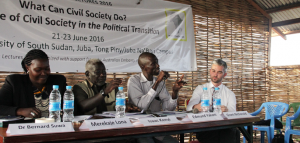With the formation of a Transitional Government of National Unity (TGoNU) and the subsequent outbreak of violence in Juba in July 2016, the role of civil society in South Sudan is more vital than ever. Can a civil society, confident and well resourced, contribute to the political discourse, engage in nation building, hold public institutions to account and improve the transparency of public life? What can civil society do, and what role can it play in the political transition? A panel of academics, activists, the church, chiefs and press discussed the nature of civil society in South Sudan and its past and future place in the public sphere in a series of public lectures at the Catholic University of South Sudan. Over three evenings the panelists and an audience of students, and members of the public and government, focused on specific institutions, including NGOs, churches and customary authorities, with a concluding discussion that explored the relationship between them. The fifth annual Juba Lecture Series were a collaboration between the Catholic University’s Institute for Applied Research and Community Outreach and the Rift Valley Institute, supported by the Australian Embassy in Addis Ababa.

Rethinking Ethiopia II: Youth and politics
Seminar report Rethinking Ethiopia, a collaborative essay competition initiative between Addis Ababa University’s Institute for Peace and Security Studies (IPSS) and the Rift Valley Institute’s



